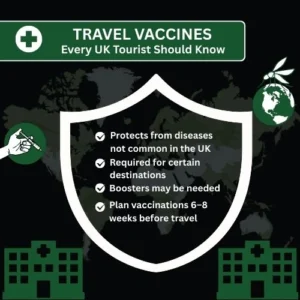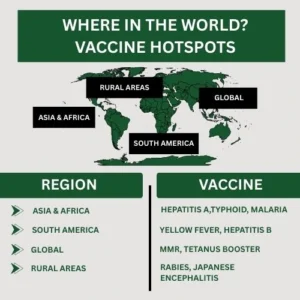
One of the best things that can happen to a person is travelling. No matter whether you are going to fly to an exotic destination, wander around the city streets, or go hiking somewhere in the backcountry, you have to plan it all out. When you get all excited about booking your flights and packing your bags, one major area of concern seems to take a backseat: that of 10 essential travel vaccinations.
Being a UK tourist, your regular NHS jabs may not suffice when you are in foreign countries. You might be at risk of contracting diseases that do not exist in the UK depending on where you are going. The upside? The majority of them can be prevented using the proper vaccinations. A potpourri of the 10 most important travel vaccinations to be considered by UK tourists before travelling is presented here.
1. Hepatitis A
Why it matters: Hepatitis A is a viral disease of the liver that is contracted as a result of eating contaminated food and water. It is prevalent in those regions that are characterised by poor sanitation.
Specifically recommended to visitors to Asia, Africa, Central and South America, and Eastern Europe.
Protection: A shot is effective for one year, with a 6-12-month shot giving long-term immunity.
2. Hepatitis B
The significance: This is the viral disease that is transmitted by contact with blood or body fluids. It is not unique, as you may have imagined, particularly not in the developing world.
Indicated for prolonged travellers, individuals that take part in such activities as tattoos or piercings in other countries, or anyone working in the healthcare sector.
Its protection: A course of three shots is required over a few months or weeks.
3. Typhoid
Why it matters: Typhoid fever is life-threatening when untreated and is a contagious infection spread by contaminated food or water.
Advised against: People travelling to South Asia, sections of Africa, and South America.
Protection: An injection protects against the virus for approximately 3 years. There are also oral drug vaccines.
4. Tetanus, Diphtheria, and Polio (Td/IPV Booster)
How significant: These vaccinations are included in the standard vaccination schedule in the UK but may require a booster given every 10 years when travelling.
Who should get it: All travellers not immunised with a booster in the last 10 years.
Protection: A single dose of booster immunisation is normally adequate.
5. Rabies
The importance of it: Rabies is virtually impervious to being cured once one shows signs of it. It is transmitted by infectious animals through bites or scratches.
Recommended for: Individuals who have long stays in rural and animal-handling areas in Asia, Africa, or Central America.
Protection: Pre-travel injections administered in three doses. Although doing so needs post-exposure treatment, even when vaccinated, it is less time-consuming and easier.
6. Japanese Encephalitis
Why it matters: An insect-borne virus that is present in the countryside parts of Asia. It is very uncommon, but it might lead to inflammatory changes in the brain as well as death.
Recommended for: Travellers who spend at least a month in the countryside of Asia or engage in outdoor activities.
Protection: Two injections with a 28-day interval.
7. Yellow Fever
Why it matters: A possible lethal virus transmitted by mosquitos in some areas of Africa as well as South America. It is mandatory that one present a record of vaccination in some of these countries.
Recommended to: individuals travelling to countries where transmission of yellow fever is a risk or entry requires vaccination against yellow fever.
Protection: In most situations it delivers lifelong protection after a single dose.
8. Cholera
The reason it is important: Cholera is associated with severe diarrhoea and dehydration. It is acquired usually through infected food and water in places prone to poor sanitation.
Recommended for: Aid workers or persons who travel to high-risk regions with poor hygiene and sanitation, especially after a natural disaster.
Protection: Oral vaccine, which is two doses.
9. MMR (measles, mumps, and rubella)
Why it matters: The cases of measles outbreak are still observed all over the world, particularly in some regions of Europe, Asia, and Africa.
Indicated: As part of routine travel vaccinations, adults without any proof of MMR who were born before 1990, when the routinely scheduled MMR vaccine became popular in the UK.
Protection: The vaccine protects against it forever with a two-dose regimen.
10. Malaria (Prevention Tablets)
NB: It is not a vaccine, but prevention of malaria is equally essential.
Why it matters: Malaria is a life-threatening illness that is spread by mosquito bites. It is endemic in parts of Asia, Sub-Saharan Africa, and South America.
Should be given to all passengers to high-risk regions.
Protection: There are varieties of antimalarial pills, which are to be taken prior to, during, and after the travel.

Last-minute tips before you go
Check sooner: Certain vaccinations need more than one dose, and these are over time (so get it checked with your GP or travel clinic at least 68 weeks before travelling).
NHS vs. Private: The vast majority of travel vaccinations in the UK are free on the NHS (such as Hep A and Typhoid), although some may need the patient to turn to a privately provided vaccination.
Know before you go: Check the links to the NHS Fit for Travel or TravelHealthPro websites to get the latest specific advice based on your destination.
In Conclusion
One of the strongest tools in the safety of travel is vaccines. Saving some time to get ready and defend yourself will not only ensure that you do not become seriously ill but also will give you the peace of mind you need to get on with what is important: creating memorable experiences.
Safe travels!

Leave a Reply